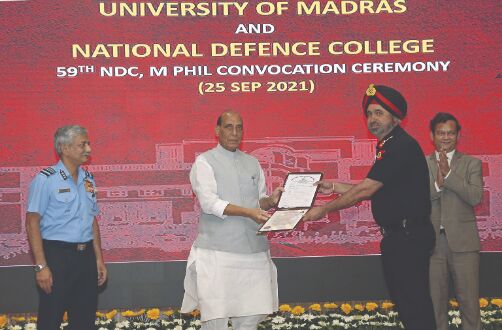'Events in Af raise questions on use of terror to change state structures'

New Delhi: The world is witnessing the destabilising effects of terrorism and the dangerous precedence of violent radical forces attempting to gain legitimacy by creating a "new normal", Defence Minister Rajnath Singh said on Saturday, referring to the Afghan crisis.
Without mentioning the Taliban, he said the developments in Afghanistan raised questions about the role of power politics and the use of terrorism as a tool to change state structures and behaviour.
In an address at the National Defence College, he said India's actions in Balakot and Galwan were clear signals to all "aggressors" that any attempt to threaten its sovereignty will be given a "swift and befitting" response.
Delving into various aspects of national security, the defence minister also called for greater synergy among the armed forces to deal with future security challenges.
In a clear reference to Pakistan, he said the turmoil caused in the region has been brought about by "aggressive designs" and the active support to "non-state players" by "irresponsible states".
"Today, the world is witness to the destabilising effects of terror and the especially dangerous precedence of violent radical forces attempting to gain legitimacy by creating new normal," he said.
Singh said that there has been a growing realisation now of India's concerns over Pakistan's support to radical and terror groups and that there was a need for dealing with the challenges unitedly.
"There is a widespread realisation today amongst all responsible nations, towards a common understanding and the need to come together against this common menace," he said referring to terrorism.
The defence minister said reverberations of the events in Afghanistan are being felt in the region and beyond.
"The recent events in Afghanistan have reinforced the reality of our times. The only certainty about evolving geopolitics is its uncertainty. Changes in state boundaries may not be as frequent today," he said.
"However, the fast-transforming structure of states and the influence that external powers can have on it is clearly evident. These events raise questions regarding the very role of power politics and the use of terrorism as a tool to change state structures and behaviour," he added.
The defence minister said that there is a lesson to be learnt from whatever has happened in Afghanistan.
"When these events are viewed, it is tempting to believe that terrorism, fear, medieval thoughts and actions, discrimination drawn on the basis of gender, practices that are seeped in inequality and dogmatic thought, can sweep aside the wishes of the people, plural ideas and inclusive structures," he said.
Singh asserted that injustice, however powerful, cannot and will not defeat the collective power of the goodness that is inherent to human existence.
Singh also elaborated on India's security challenges including attempts to change the status quo along the northern border with China and cross-border terrorism on the western frontier.
"We are faced with belligerence on our land borders challenging the status-quo, cross border support to terrorism, and increasing efforts to counter our goodwill and outreach in our neighbourhood,"
he said.
"While it (India) is totally committed to peace and goodwill amongst all nations, it has shown its steely resolve that threats to its internal and external security will no longer be tolerated," Singh said.



